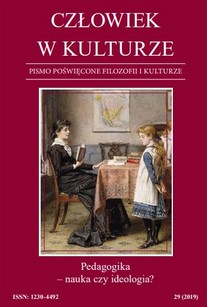O. Jacek Woroniecki a Jean-Jacques Rousseau: spór o naturę
Jacek Woroniecki and Jean-Jacques Rousseau: a dispute over a nature
Author(s): Tomasz MitraszewskiSubject(s): Early Modern Philosophy, Sociology of Education, Philosophy of Education, Pedagogy
Published by: Fundacja »Lubelska Szkoła Filozofii Chrześcijańskiej«
Keywords: civil education; child; happiness; human potentiality; natural education; natural man; man-citizen; upbringing; rational being; state of nature;
Summary/Abstract: J. J. Rousseau introduced and described an idea of a human life and its universal happiness that may be achieved only by living in compliance with nature. But firstly human nature must be understood. He therefore suggested an introspective way of self-cognition as the most effective and reliable. Individualistic analytical perspective adopted by Rousseau, saturated with sentimental attitude, as well as his personal life path resulted in paradoxical conclusions regarding the sphere of education. Emil, an important figure of Rousseau’s concepts of human condition returns to his natural state and is finally doomed to a life of loneliness filled with sterile contemplation of his own separateness – in an idealized, utopian nature. The upbringing concepts of J. J. Rousseau and J. Woroniecki fully reflect the essence of their separate understanding of nature. J. Woroniecki shows a different concept of man as an individual rational being, guided by the decisions of the will, feelings and desires resulting from his sensualcorporeal sphere that determines his behavior. He derived human social functioning straight from his nature. Human potentiality demands attentive care from the very childhood and finds its full expression in the essence and role of man’s process of upbringing and education – integrated and complementary ways of human development. Woroniecki and his paideia combine in a harmonious whole what is often contrasted in other systems: the individual and society; creative development and respect for universal standards. His practical ethics defines how to achieve the goals of education. The Woroniecki’s concept of upbringing, its importance, timeliness and permanence, seems to be an open system – also for discussions taking place today around the problems of philosophically understood pedagogy.
Journal: Człowiek w Kulturze
- Issue Year: 2019
- Issue No: 29
- Page Range: 230-249
- Page Count: 20
- Language: Polish

